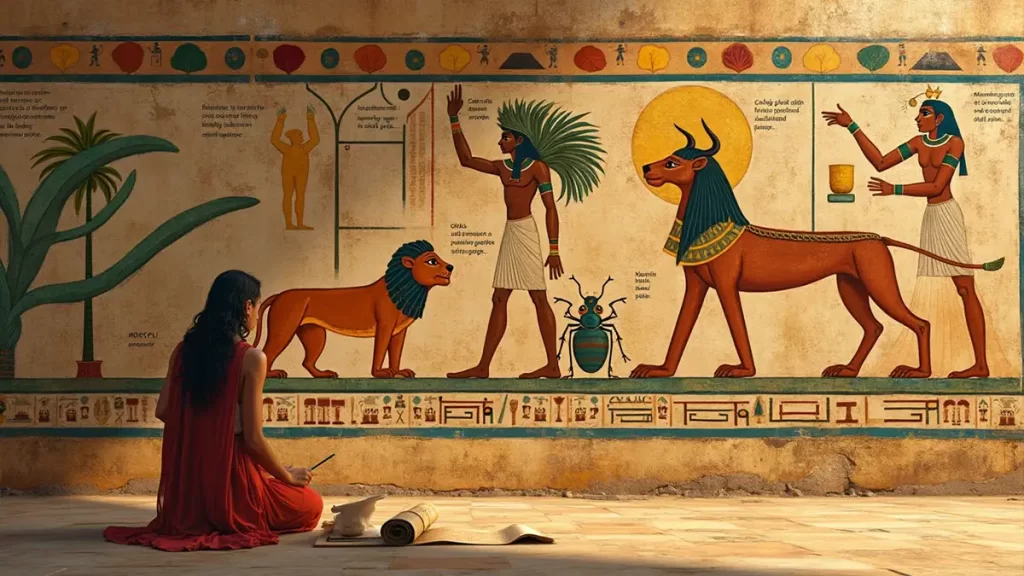Introduction to Dreams in Ancient Egyptian Culture
In the land of pyramids and pharaohs, dreams weren’t just figments of imagination. For the ancient Egyptians, dreams were a bridge between the human world and the divine.
They believed that through dreams, the gods communicated directly with them, offering guidance, warnings, and sometimes even prophecies.
Imagine living in a time where every dream could be a message from a higher power, a glimpse into the future, or a reflection of your deepest fears.
In this journey, we’ll explore how the ancient Egyptians viewed dreams, the symbolism they cherished, and how they interpreted these nocturnal visions to guide their lives.
Navigate to What Matters
The Significance of Dreams in Ancient Egyptian Culture
For the Egyptians, dreams were much more than fleeting thoughts. They were sacred. Dreams were seen as a way for the gods to interact with the living.
If you dreamt of a deity, it wasn’t just a coincidence—it was believed to be a direct encounter with the divine.
This made dreams powerful tools for understanding the will of the gods and the direction of one’s life.
The ancient Egyptians placed great importance on recording and interpreting their dreams. Temples often had priests who specialized in dream interpretation.
These priests would analyze the symbols and events in dreams, deciphering their meanings to help guide the dreamer’s actions.
In many cases, the interpretations of these dreams could lead to decisions that affected entire communities, not just individuals.
Common Symbols and Their Meanings in Egyptian Dreams
Symbols in Egyptian dreams were rich with meaning. For example, dreaming of a snake could symbolize protection, as the snake was associated with the goddess Wadjet, the protector of the pharaohs.
But snakes could also represent danger, depending on the context of the dream.
Another powerful symbol was the scarab beetle, which represented rebirth and transformation. If someone dreamt of a scarab, it might indicate that they were about to undergo a significant change in their life.
The Nile River, a lifeline of Egypt, was another common dream symbol. Dreaming of the Nile could represent abundance and prosperity, or it might indicate a journey or transition.
Animals were frequent visitors in Egyptian dreams, each with its own set of meanings.
Cats, for example, were sacred animals linked to the goddess Bastet. Dreaming of a cat might symbolize protection, grace, or independence.
On the other hand, lions in dreams were seen as symbols of power and strength, often linked to the king or the sun god Ra.
The Role of Dream Interpretation in Egyptian Society
Dream interpretation wasn’t just a personal practice—it was an essential part of Egyptian society. The interpretations provided by temple priests could influence everything from agricultural practices to royal decisions.
If a pharaoh had a troubling dream, he might call upon the priests to interpret it, and their guidance could lead to significant actions, such as changes in policy or military campaigns.
The Egyptians also believed that dreams could foretell future events.
A positive dream might reassure someone that the gods favored their plans, while a negative one could serve as a warning to change course.
This belief in the prophetic power of dreams made them crucial in planning and decision-making, both on a personal and societal level.
The Spiritual and Religious Significance of Dreams
In ancient Egypt, dreams were deeply intertwined with religion and spirituality. The Egyptians believed that during sleep, the soul could leave the body and travel to the realm of the gods.
This journey allowed the dreamer to receive messages and insights that were otherwise inaccessible in the waking world.
The practice of seeking divine guidance through dreams was not limited to the common people. Pharaohs and high priests often sought dreams to gain favor with the gods or to seek answers to complex problems.
Dreams in ancient Egyptian culture were considered a divine gift, a way to connect with the spiritual world and gain wisdom that could not be found in the physical world.
The Legacy of Egyptian Dream Interpretation
Even though thousands of years have passed since the time of the pharaohs, the legacy of Egyptian dream interpretation still resonates today.
The symbols and meanings that the Egyptians attributed to their dreams have influenced other cultures and continue to be a source of fascination for modern scholars and enthusiasts alike.
The belief that dreams hold power, that they can guide us, warn us, and even change our destiny, is a thread that runs through history.
Egyptian dream interpretation offers a window into how one of the world’s oldest civilizations understood the mysterious world of dreams.
Personal Reflection Questions for Readers
Have you ever had a dream that felt like more than just a dream? Could it have been a message, a sign, or even a warning?
Think about the symbols that appear in your dreams. Could they carry meanings similar to those the ancient Egyptians believed in? Reflect on your dreams and consider what they might be trying to tell you.
Lucky Numbers Related to Egyptian Dream Symbols
In the mystical world of Egyptian dream interpretation, certain numbers held special significance. The number 9 was sacred, often symbolizing completeness or the divine.
Another important number was 3, representing balance and harmony, often linked to the gods.
If you feel inspired by these ancient symbols, why not try your luck with numbers? Consider using 9-3-7 for a Pick 3 or 9-3-1-2 for a Pick 4. Perhaps the wisdom of the ancient Egyptians will guide you to fortune!


